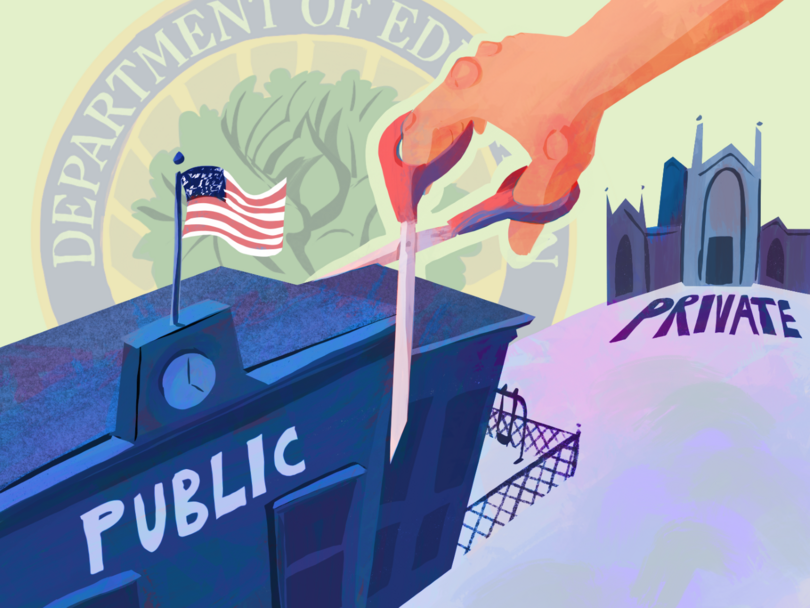Opinion: Dismantling DOEd will disproportionately hurt public schools

The Trump administration cut significant funding for public education. Our columnist emphasizes staying informed about local schools and government actions and predicts disproportionate impacts. Flynn Ledoux | Illustration Editor
Get the latest Syracuse news delivered right to your inbox.
Subscribe to our newsletter here.
As we advance into the third month of President Donald Trump’s second term, it’s clear that slashing and burning is a norm under his administration.
In under 100 days, the Trump administration slashed large parts of the Department of Health and Human Services, hacked away most of USAID and began a steady deconstruction of the National Park Service.
No singular issue takes precedence over another, and they combine to represent a dour direction for our nation. That being said, one cut in particular should draw all of our attention, considering our status as members of a private university: Trump’s March 20 order to dismantle the Department of Education.
Trump would need further support from Congress to completely scrub out the DOEd, but the ultimate goal still remains in reach. Limiting funds toward the Federal Application for Federal Student Aid and training is only the beginning. The craters these cuts leave in essential functions of the department are becoming more visible every day.
Trump has stated multiple times that this change will help by giving states greater control over education, but we need to scrutinize the agenda being pushed here. It’d be nothing shy of disastrous for the development of young students in the United States.
If the DOEd is dismantled at the federal level, curriculum decisions will fall on each state, which will disproportionately affect students attending public school compared to those who go to private schools. And many of those students can only afford higher education by using FAFSA, which is completed by more than two-fifths of high school seniors and is how 87.3% of first-time college students pay for school.
Syracuse University is one of only 38 schools in the country that’s attended by more students from the top 1% of earning families than from the bottom 20%. The likely reason for this is the school’s high tuition, which is a barrier of entry for those without external aid.
I went to a public high school in Houston, Texas, and I’ve seen firsthand what can happen when Republicans take over public education. From the students I’ve spoken to in my freshman year at SU, many grew up either in a blue state, attended a private high school or fit into both categories.
Right before my senior year of high school, the Texas Department of Education — the body in charge of education throughout the state — forcibly took over the Houston Independent School District. Run by conservatives in the state government, the TEA disapproved of the HISD”s performance, which was mostly run by liberal lawmakers from Houston, a blue city.
Gov. Greg Abbott cited the poor performance of select Houston high schools for the decision. But critics of the takeover see it as a Republican effort to exert control over a liberal city. Many attribute it to racism.
Putting aside the partisan feuds at the heart of the usurpation, this action has led to the conversion of libraries into detention centers and the mass resignations of teachers and principals.
I say none of this to project my own experiences onto the entirety of SU. I aim to provide a prescient and wide-scoped example of how partisan corruption negatively impacts schools, as well as assert it’s not in most students’ interests to “return education to the states,” as Trump suggests.
The cuts to the DOEd have even more ripple effects than those I’ve witnessed, and belong to a larger, more sinister effort to disenfranchise public education in favor of private schools and the wealthy.
Funding isn’t just being cut from public schools across America — the money is being re-invested in vouchers for private school tuition to increase the amount of children attending private schools.
While this may look good on paper, America can’t turn its back on public education. I harbor no ill will toward private schools, but I strongly believe the federal government has zero business showing this overt preference toward private education over America’s systemic need for adequate schooling.
It’s imperative that politicians and decision-makers on both sides of the aisle join forces for the benefit of American students.
If Republicans truly believed there was something wrong with public schools, the logical solution should have been to invest in revitalization and dig deep into solutions for making them better, not to hand out life jackets and jump ship.
Protecting public education from the collapse of its centralized institution isn’t just about protecting the quality of the education — it’s also about guarding the many programs that keep kids fed and off the streets.

Hannah Mesa | Design Editor
These programs are imperative in low-income school districts. Private schools theoretically could provide this kind of care, but often don’t extend the effort.
These concerns are relevant to all students, whether you’re either already out of high school or a prospective student preparing for college.
Currently, 95% of disabled students receive special attention in public school, which is paid for through federal programs. Should the DOEd go away, those inclusive initiatives would disappear too.
Title I, which allocates funds to low-income schools, is also administered at the federal level. If cut, it would no longer ensure funding to schools in disadvantaged areas. Further, it would inhibit federal oversight for civil rights issues within schools.
Regardless of which state you live in, monitor what happens at your local schools.
You should pay attention to education initiatives on your ballots to ensure local governments don’t turn their backs on public education without your rightful input.
No matter your educational history, recognize and understand the importance of this critical institution that works to manage discrepancies in the lives of millions of Americans. Fight for its existence, and fight for others’ education if not for your own.
Ben Newman is a freshman at Syracuse University. His column appears bi-weekly. He can be reached at ibnewman@syr.edu.





